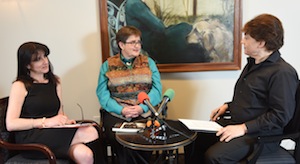What If Lincoln Had Lived? Eleanor Roosevelt Expert Allida Black Gives Us Food for Thought

Allida Black, research professor of history and international affairs at George Washington University
What was the first step toward emancipation in American history?
That’s one of the questions that Grateful American™ Foundation’s David Bruce Smith and executive producer Hope Katz Gibbbs asked Allida Black, a research professor of history and international affairs at George Washington University, during her appearance on the Grateful American™ Radio Show.
Black is also the founding editor of The Eleanor Roosevelt Papers, a project designed to preserve, teach, and apply Eleanor Roosevelt’s writings and discussions of human rights and democratic politics.
Her many honors include receiving the 2001 Person of Vision Award (from the Arlington County Commission on the Status of Women) and the James A. Jordan Award for Outstanding Dedication and Excellence in Teaching (from Penn State University).
Black has also written four books related to Eleanor Roosevelt and politics as well as teacher guides for PBS documentaries.
 David Bruce Smith: We are celebrating a number of important anniversaries right now, including the 50th anniversary of Selma and the 150th anniversary of the Lincoln assassination and the end of the Civil War. How do you think Reconstruction would have played out if Lincoln had lived?
David Bruce Smith: We are celebrating a number of important anniversaries right now, including the 50th anniversary of Selma and the 150th anniversary of the Lincoln assassination and the end of the Civil War. How do you think Reconstruction would have played out if Lincoln had lived?
Allida Black: I can only say this: It would have been different. We know that within a week before John Wilkes Booth murdered Abraham Lincoln, Lincoln was in fact talking publicly about voting rights for African-American soldiers who fought in the Civil War.
Some historians of great note argue that that was the tipping point that pushed the assassin to murder.
If in fact Lincoln had lived, it’s open to debate whether or not voting rights would have been extended. But I can’t believe that Lincoln would have not launched a national debate on voting rights for African-Americans who fought and risked their lives.
And if the debate had taken place, we would have a whole new concept of Reconstruction — but we don’t know how that debate would have ended. It could have made the white Democratic South even more crazy. Or it could have sent a signal that said,
“We fought this war and we have to figure out how to come together. We have ended slavery, but emancipation is not just freedom from slavery; it is the freedom to become a citizen.”
Had the nation debated that latter point, the huge battle would have been over “What does citizenship mean?” I think that is the quintessential conversation that we are still having today, and that Lincoln could have played a huge role in helping frame that debate.
David Bruce Smith: How would Lincoln have assessed emancipation today? There are really more slaves now than there ever have been before, if you include female slavery and drug slavery.
Allida Black: There is certainly sex trafficking and forced slavery all over the world, but it is hard to project the definitive numbers. What I do know is that were they alive today, Abraham Lincoln and Eleanor Roosevelt — two of the most articulate, risk-taking voices — would have spoken up against trafficking and for a living wage.
And they would have challenged us all to understand that we have the courage to be the better angels of our nature.
Hope Katz Gibbs: Allida, tell us more about the connection between Roosevelt and Lincoln. What did Eleanor Roosevelt learn from him and some of the Founding Fathers she greatly admired?
Allida Black: Eleanor believed that we were always on trial to show what democracy means and that America was always growing and always changing.
She felt that democracy was like a rubber band — you could stretch it and it would contract a little, and you would stretch it again and it would come back a little bit. Benjamin Franklin certainly thought that, too; you could see him flirting with the idea.
The Founding Fathers whom Eleanor embraced the most were Franklin and Thomas Paine — but for very different reasons. Ben Franklin because he understood where we would be down the road. For example, Franklin was the only one of the Founding Fathers who argued over slavery.
He really understood that women needed to be educated; he understood that all citizens needed to be educated. In fact, that philosophy spurred the creation of America’s public schools as well as public libraries. Eleanor was devoted to Franklin.
She also loved Paine’s “These are the times that try men’s souls,” essay, which was published in the 1776 pamphlet “Common Sense,” which argued for America’s independence from England.
Eleanor believed that for people to take risks, especially to take risks to build a new nation, they had to have a vision that was not only about themselves, but that was about others.




